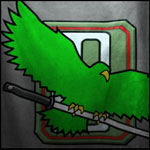 CanAm, on 02 July 2012 - 02:10 PM, said:
CanAm, on 02 July 2012 - 02:10 PM, said:
I have seen the words quiaff and quineg being thrown around a lot, and it is often used completely incorrectly.
Quiaff means Query Affirmative. Quineg means Query Negative.
Quiaff and quineg are rhetorical modifiers that sit at the end of a statement, in order to make it a rhetorical question. You can NOT use quiaff and quineg to respond to someone. The answer to a statement is aff or neg. The answer to a quiaff or quineg proposition is still aff or neg.
To put it simply, quiaff and quineg are used as a sort of "He is bad, yes?" or "He is bad, am I right?". Translated into Clanspeak, this is worded, "He is bad, quiaff?". The answer (if he is, in fact, bad) is simply, "aff".
Let us review-
1) Only use quiaff and quineg only to turn a statement (most likely one of opinion) into a rhetorical question (a question you already know the answer to). This means they are only used at the end of a sentence!
2) You may not respond with "quiaff" or "quineg". The response to a question is always "aff" or "neg".
3) Avoid using quiaff and quineg for something that is blatantly obvious or a universally accepted opinion or fact. Quiaff and quineg should NOT be used if everyone is going to agree- If I were to say in the Clan Jade Falcon chatterweb "We Jade Falcons are the mightiest of all Clans, quiaff?", this would be an incorrect use.
4) Quiaff and quineg are used to imply disdain, uncertainty, a non-normative opinion, a rallying bolster to morale, or lack of respect. As such, they are often used by higher ranking officials to assert rank and superiority over their lower ranked staff. Conversely, they are used by lower ranking staff as a light insubordination towards their superiors.
tl;dr- Stop using quiaff and quineg so much. Many of you are using it incorrectly.
Your intentions are good but seriously, quiaff & quineg are used when the
speaker believes the answer will be in the positive or the negative.
So to use your Jade Falcon example, it would be
totally appropriate.
It can be used to enforce a point or garner support:
Quote
"Perhaps, Star Commander Jorge, you misunderstood the question?" Bast stood up. "You are a freeborn, after all. I forget that things must be spelled out. What I said, honored warrior, was that the Clan eugenics program produced superior warriors. Which, of course, means that it produces superior beings. Therefore, we praise the eugenics program here, quiaff?"
Aidan knew what he must respond, and he did not know why he could not say it. Why did a simple "aff" lodge in his throat? Why could he not say it? Beside him, he could sense Horse bristling.
Bast leaned toward Aidan, the stink of his alcohol-saturated breath rushing forward as he spoke. "We praise the eugenics program here, quiaff? QUIAFF, you rotten freebirth!"
Bloodname - Pg.11
Quote
"They could not have advance information, as you say, Star Commander. It is obvious that the Jade Falcons do not value Kael Pershaw's genetic legacy. They have given him a backwater command on a planet the Clan does not value highly. His Cluster's equipment is obsoleste and his command is full of freebirths. Clan Jade Falcon would never even imagine that Clan Wolf desires the spawn of Kael Pershaw for mixture with one of our own, quiaff?"
Quote
Radick glanced up at Ward. "That should put Kael Pershaw at a severe disadvantage. One lost DropShip containing a full Trinary of the forces he bid. We have a marvelous advantage with just one brilliant maneuver, quiaff?"
Quote
"Star Commander Jorge, you wear the dark band, quiaff?"
(If you read Bloodname, Aidan clearly had the band on & it was no small accessory, so this was blatantly obvious.)
Quote
"And you are Jade Falcon warriors, who can fight any attacker with whatever firepower you have, quiaff?"
Bloodname - various pages
I can give you
many more example if you wish. If you are doing this for educational purposes, do it correctly.
Edited by Jaroth Winson, 02 July 2012 - 05:13 PM.
 WardenWolf, on 02 July 2012 - 02:57 PM, said:
WardenWolf, on 02 July 2012 - 02:57 PM, said:



























